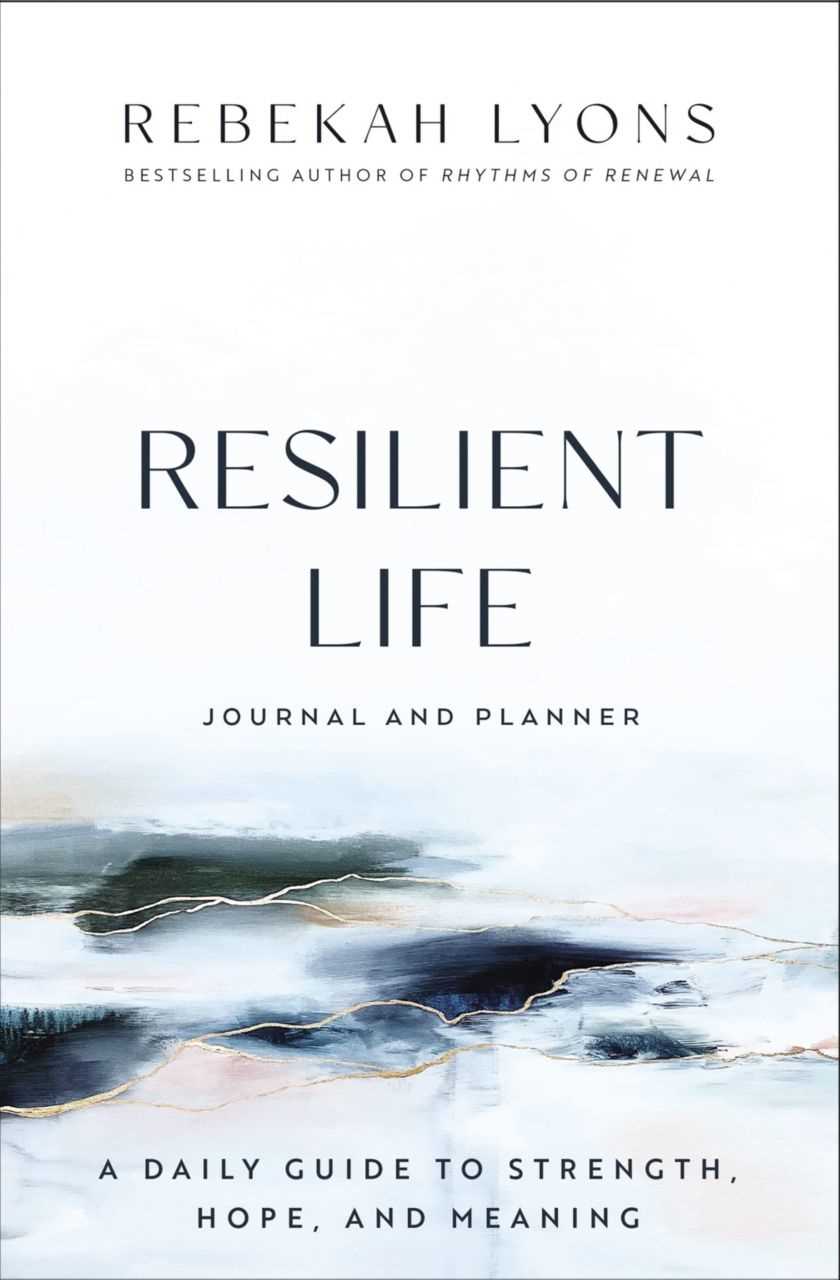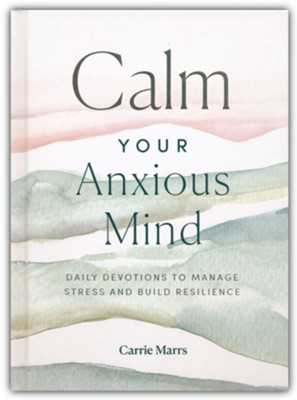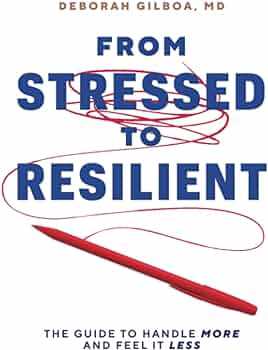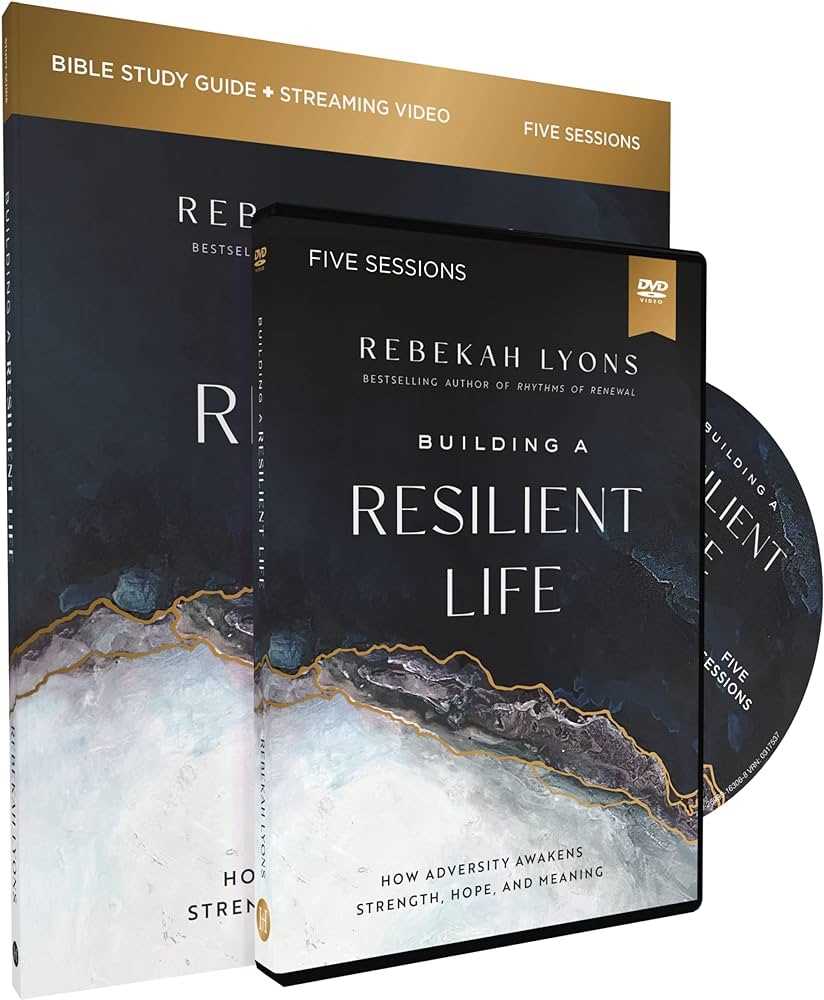
Stress is an inevitable part of life. It can come in many forms, from the pressures of work and relationships to the challenges of everyday living. However, what sets resilient individuals apart is their ability to navigate through these stressors with grace and strength. In this guide, we will explore how to build resilience to stress with the help of scriptures.
Resilience is the ability to bounce back from adversity and maintain a sense of well-being. It is not about avoiding stress, but rather, how we respond to it. By incorporating scriptures into our lives, we can find solace, guidance, and strength to face life’s challenges head-on.
One way to build resilience with scriptures is by meditating on passages that speak to our specific stressors. For example, if we are feeling overwhelmed at work, we can turn to scriptures that remind us of God’s provision and guidance. By internalizing these words and allowing them to penetrate our hearts, we can find peace and renewed energy to tackle our tasks.
Another way to build resilience is by finding comfort in scriptures that remind us of our worth and identity. In times of stress, it is easy to lose sight of who we are and what we are capable of. By meditating on passages that highlight our strength and potential, we can regain our confidence and resilience.
In conclusion, building resilience to stress is a lifelong journey. By incorporating scriptures into our lives, we can find the strength, guidance, and comfort we need to navigate through life’s challenges. So, let us take the time to meditate on these precious words, allowing them to build us up and help us become more resilient individuals.
Why Building Resilience is Important

Stress is an inevitable part of life. We all experience various forms of stress, whether it’s from work, relationships, or other personal challenges. However, the key to dealing with stress effectively lies in our ability to build resilience.
Resilience is the ability to bounce back from difficult situations and overcome adversity. It is like a muscle that can be strengthened and developed over time. When we have a strong sense of resilience, we are better equipped to handle stress and navigate through life’s challenges.
So, how does building resilience help us in dealing with stress? First and foremost, it allows us to maintain a positive mindset even in the face of adversity. Resilient individuals are able to see setbacks as temporary and are more likely to find solutions to their problems.
Building resilience also helps us develop healthy coping mechanisms. Instead of turning to unhealthy habits or negative behaviors to deal with stress, resilient individuals are more likely to engage in activities that promote their well-being, such as exercise, meditation, or spending time with loved ones.
Furthermore, resilience allows us to adapt to change more easily. Life is constantly changing, and being able to adapt and adjust to new circumstances is crucial for our overall well-being. Resilient individuals are able to embrace change and view it as an opportunity for growth rather than a threat.
In addition, building resilience helps us maintain strong relationships. When we are resilient, we are better able to communicate effectively, resolve conflicts, and provide support to others. This not only strengthens our relationships but also provides us with a strong support system during times of stress.
In conclusion, building resilience is important because it equips us with the necessary tools to effectively deal with stress. It allows us to maintain a positive mindset, develop healthy coping mechanisms, adapt to change, and maintain strong relationships. By building resilience, we can navigate through life’s challenges with grace and strength.
Understanding the Impact of Stress on Mental Health

Stress is a common part of life that everyone experiences. It can come from various sources such as work, relationships, and personal challenges. While a certain level of stress can be motivating and help us perform better, excessive or chronic stress can have a negative impact on our mental health.
When we are stressed, our bodies release hormones that prepare us for a fight-or-flight response. This response can be helpful in dangerous situations, but when stress becomes chronic, it can lead to a range of mental health issues.
Chronic stress can contribute to the development or worsening of conditions such as anxiety disorders, depression, and even post-traumatic stress disorder (PTSD). It can also weaken our immune system, making us more susceptible to physical illnesses.
Building resilience to stress is essential for maintaining good mental health. One effective way to do this is by incorporating scriptures into our daily lives. Scriptures provide guidance, comfort, and encouragement, reminding us that we are not alone in our struggles.
Scriptures can help us to:
- Find peace: Many scriptures offer words of peace and assurance, reminding us to cast our burdens upon a higher power and trust in His plan.
- Gain perspective: Scriptures can help us shift our focus away from our problems and onto the bigger picture. They remind us that there is more to life than the current stressors we may be facing.
- Build resilience: Reading scriptures regularly can strengthen our faith and provide us with the strength to face difficult times. They can serve as a source of hope and inspiration.
- Practice self-care: Scriptures often emphasize the importance of taking care of ourselves, both physically and mentally. They remind us to prioritize rest, relaxation, and seeking support from others.
By incorporating scriptures into our daily routine, we can build resilience to stress and improve our mental health. It is important to remember that everyone’s journey is unique, and what works for one person may not work for another. Finding the scriptures that resonate with us personally and incorporating them into our lives can help us navigate through stress and find inner strength and peace.
Recognizing the Benefits of Resilience

Building resilience with scriptures is a powerful way to navigate through the difficulties of life. Resilience can be defined as the ability to bounce back from adversity and adapt to change. By developing resilience, individuals can strengthen their mental and emotional well-being, leading to a more fulfilling and purposeful life.
One of the key benefits of resilience is the ability to effectively cope with stress. Life is filled with challenges and setbacks, and resilience equips individuals with the tools to navigate these obstacles without being overwhelmed. Scriptures provide guidance and encouragement, reminding individuals of their inner strength and the presence of a higher power who can provide comfort and support.
Resilience also enables individuals to maintain a positive outlook and mindset. It helps them to see setbacks as opportunities for growth and learning, rather than as insurmountable obstacles. By turning to scriptures, individuals can find wisdom and inspiration to stay motivated and focused on their goals, even in the face of adversity.
In addition, resilience fosters better relationships and connections with others. It allows individuals to empathize with and support others who may be going through similar challenges. By drawing on scriptures, individuals can find guidance on how to show compassion, forgiveness, and understanding towards others, ultimately strengthening their relationships and creating a sense of community.
Furthermore, resilience promotes overall well-being and a sense of purpose. It helps individuals to develop a strong sense of self and to identify their values and beliefs. By incorporating scriptures into their lives, individuals can find guidance on how to live a meaningful and purposeful life, aligning their actions with their core principles.
In conclusion, recognizing the benefits of resilience is essential in building a strong foundation for navigating life’s challenges. By turning to scriptures, individuals can develop resilience and strengthen their ability to cope with stress, maintain a positive mindset, build better relationships, and live a purposeful life. Embracing resilience with scriptures is a powerful tool for personal growth and well-being.
How Scriptures Can Help Build Resilience

In today’s fast-paced and stressful world, building resilience is essential for maintaining mental and emotional well-being. Resilience allows individuals to bounce back from adversity and overcome challenges with strength and determination. One powerful tool that can aid in the development of resilience is the use of scriptures.
Scriptures, such as those found in religious texts like the Bible, provide guidance, comfort, and inspiration. They offer words of wisdom and encouragement that can help individuals navigate difficult situations and find inner strength. By incorporating scriptures into their daily lives, individuals can build resilience and better cope with stress.
So, how can scriptures help build resilience?
| 1. Providing Perspective | Scriptures can help individuals gain a broader perspective on their problems and challenges. They offer timeless wisdom and remind individuals that they are not alone in their struggles. By focusing on the bigger picture, scriptures can help individuals find hope and resilience in the face of adversity. |
| 2. Offering Guidance | Scriptures provide guidance on how to navigate difficult situations and make wise decisions. They offer practical advice and principles that can help individuals overcome stress and make positive choices. By following the teachings found in scriptures, individuals can develop resilience and find strength in their faith. |
| 3. Promoting Self-Reflection | Scriptures encourage self-reflection and introspection. They prompt individuals to examine their thoughts, emotions, and actions, and encourage them to grow and improve. Through self-reflection, individuals can develop resilience by identifying areas of weakness and working towards personal growth. |
| 4. Cultivating Gratitude | Scriptures often emphasize the importance of gratitude and contentment. By focusing on the blessings in their lives, individuals can develop resilience and find strength in the midst of challenges. Scriptures teach individuals to appreciate what they have, rather than dwelling on what they lack. |
| 5. Providing Comfort and Hope | In times of stress and difficulty, scriptures can provide comfort and hope. They offer words of encouragement and assurance that individuals are not alone in their struggles. By finding solace in scriptures, individuals can develop resilience and find the strength to persevere. |
In conclusion, scriptures can be a powerful tool in building resilience to stress. By providing perspective, offering guidance, promoting self-reflection, cultivating gratitude, and providing comfort and hope, scriptures can help individuals develop the inner strength needed to overcome challenges and thrive in the face of adversity.
Finding Strength and Comfort in Scripture

To build resilience to stress, scriptures can play a vital role in providing strength and comfort. The power of scripture lies in its ability to guide and inspire individuals through difficult times. Here’s how scriptures can help in cultivating resilience:
- Guidance: Scriptures offer guidance on how to navigate the challenges and stressors of life. They provide wisdom and insights that can help individuals make informed decisions and find solutions to their problems.
- Inspiration: The scriptures are filled with stories of individuals who have faced adversity and overcome it with strength and faith. These stories can serve as a source of inspiration, reminding individuals that they too can find the strength to overcome their own challenges.
- Comfort: Scriptures can provide a sense of comfort and solace during times of stress. They offer words of reassurance and remind individuals that they are not alone in their struggles. The scriptures can bring a sense of peace and calmness to the mind and heart.
- Hope: Scriptures instill hope in individuals, reminding them that there is always a light at the end of the tunnel. They offer promises of a better future and encourage individuals to keep moving forward, even in the face of adversity.
- Reflection: Scriptures encourage individuals to reflect on their experiences and emotions. They provide a space for introspection and self-discovery, helping individuals gain a deeper understanding of themselves and their purpose in life.
By incorporating scriptures into daily life, individuals can build resilience to stress and find strength and comfort in their faith. Whether it’s through reading passages, reciting prayers, or participating in religious rituals, scriptures can serve as a powerful tool in cultivating resilience and overcoming the challenges of life.
Learning from Biblical Examples of Resilience

Building resilience to stress with scriptures is a powerful way to navigate the challenges of life. The Bible provides numerous examples of individuals who faced adversity and demonstrated remarkable resilience. By studying their stories, we can learn valuable lessons on how to build resilience in our own lives.
One biblical example of resilience is the story of Joseph. Despite being sold into slavery by his own brothers and facing numerous trials and tribulations, Joseph remained steadfast in his faith and trust in God. Through his unwavering resilience, Joseph was able to rise from being a slave to becoming a powerful leader in Egypt, ultimately saving his family and the nation from famine.
Another example is the story of David. As a young shepherd boy, David faced the giant Goliath with only a sling and five stones. Despite being the underdog, David’s resilience and unwavering trust in God allowed him to defeat Goliath and become a renowned king of Israel. David’s story teaches us the importance of courage, perseverance, and relying on God’s strength in the face of adversity.
Additionally, the story of Job showcases incredible resilience in the face of unimaginable suffering. Despite losing his wealth, health, and family, Job remained faithful to God and refused to curse Him. Through his resilience, Job was ultimately restored and blessed abundantly. His story teaches us the importance of maintaining faith and trust in God, even in the midst of overwhelming hardship.
These biblical examples highlight how individuals can build resilience to stress with scriptures. By studying their stories, we can learn valuable lessons on how to remain steadfast in our faith, trust in God’s plan, and persevere through difficult times. The scriptures provide us with the guidance and strength we need to overcome challenges and build resilience in our own lives.
| Example | Lesson Learned |
|---|---|
| Joseph | Trusting in God’s plan can lead to unexpected blessings. |
| David | Courage and reliance on God’s strength can help us overcome giants in our lives. |
| Job | Maintaining faith and trust in God during suffering can lead to restoration and blessings. |
Practical Tips for Building Resilience with Scriptures

Building resilience to stress with scriptures is a powerful way to strengthen your mental and emotional well-being. Here are some practical tips on how to incorporate scriptures into your daily life:
- Read and Meditate: Set aside a specific time each day to read scriptures that speak to resilience and strength. Reflect on the meaning of the verses and how they can apply to your own life.
- Memorize Key Verses: Choose a few key verses that resonate with you and commit them to memory. Repeat them to yourself during moments of stress or difficulty to anchor yourself in the truth of God’s word.
- Create Scripture Cards: Write down meaningful scriptures on small index cards and carry them with you throughout the day. Whenever you feel overwhelmed, take out a card and read it as a reminder of God’s promises.
- Journal: Keep a journal where you can write down scriptures that inspire and encourage you. Reflect on how these verses have helped you build resilience in the face of stress.
- Pray: Incorporate scriptures into your prayers. Use them as a guide to help you express your needs and seek God’s guidance in building resilience.
- Join a Study Group: Find a Bible study group or community that focuses on building resilience. Engage in discussions and share insights with others who are also seeking to strengthen their resilience with scriptures.
- Apply Scriptures to Daily Challenges: Whenever you face a challenging situation, ask yourself how you can apply scriptures to overcome it. Seek wisdom and guidance from God’s word.
- Share Scriptures with Others: Spread the message of resilience by sharing scriptures with friends, family, and those in need. Encourage others to build their resilience with scriptures as well.
By building resilience with scriptures, you can find strength, hope, and peace in the midst of stress and adversity. Take these practical tips and incorporate them into your daily life to experience the transformative power of God’s word.
Developing a Daily Scripture Practice

Developing a daily scripture practice can be a powerful tool in building resilience to stress. By incorporating scriptures into your daily routine, you can find guidance, inspiration, and strength to navigate through challenging times.
Here are some steps on how to develop a daily scripture practice:
- Set aside dedicated time: Find a specific time each day that you can devote to reading and reflecting on scriptures. It could be in the morning before starting your day, during a lunch break, or in the evening before bed.
- Choose a scripture: Select a scripture that resonates with you or addresses a specific area of stress or challenge in your life. You can use a devotional book, online resources, or a personal collection of scriptures to find relevant passages.
- Read and reflect: Take the time to read the scripture slowly and attentively. Reflect on its meaning and how it relates to your current situation. Consider journaling your thoughts and insights.
- Apply the scripture: Think about how you can apply the scripture’s message to your life. Are there actions you can take or changes you can make based on the scripture’s teachings? Use the scripture as a guide for your thoughts, words, and actions throughout the day.
- Share with others: Consider sharing the scripture and its impact on your life with others. This could be through discussions with friends or family, joining a scripture study group, or even posting about it on social media.
By developing a daily scripture practice, you can cultivate a deeper connection with your faith and find solace and strength in the midst of stress. Remember to be consistent and patient with yourself as you embark on this journey of building resilience through scriptures.

I am Patrina de Silva, a psychologist and mental health blogger in Sri Lanka. After obtaining psychology degrees from the University of Colombo and Monash University, I returned home to work as a counselor while also starting the popular blog “Pressy but Happy” to provide advice on psychological issues. Over the past decade, my empathetic articles have made my blog a leading mental health resource in the country. In addition to writing, I maintain a private therapy practice, frequently volunteer counseling time, and conduct seminars, driven by my passion for destigmatizing mental illness and educating the public on the mind-body connection. I strive to be an influential voice in my field through my compassionate approach.
